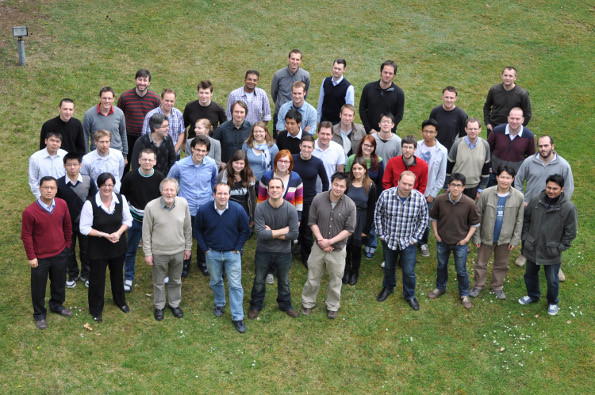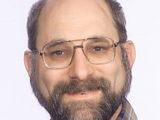CSEE Professor Curtis Menyuk wins Humboldt Research Award
Coveted international prize a win for UMBC, too
By Sarah Hansen
UMBC Professor of Computer Science and Electrical Engineering Curtis Menyuk recently won the prestigious Humboldt Research Award. Academics from any discipline are eligible for the €60,000 award, which comes with the opportunity to conduct research with a collaborator in Germany for up to a year. Awardees are selected based on accomplishments from their entire careers, as well as their potential to continue producing cutting-edge research.
“If you look at the previous winners, anybody in my field who’s won a Nobel Prize is on the list,” Menyuk said, underscoring the award’s prestige and potential to propel a researcher’s career to new heights.
Menyuk has already made quite an impact in nonlinear optics. In the 1980s, he developed the equations that govern the propagation of light through fiber optic cables—the same cables that deliver internet, cable television, and phone services to households and businesses around the world. The equations are particularly relevant for light travel over long distances, because they take into account physical effects that aren’t as important for short-distance travel. After their initial publication, the equations quickly began appearing in textbooks.
Menyuk’s favorite research project, however, is predicting and modeling the existence of a property called “self-similarity” in light propagation. “Self-similarity is really important in nature,” Menyuk said. Fractals are the epitome of self-similar structures, and the ever-repeating patterns in snowflakes, lightning, and Queen Anne’s Lace flowers are examples. For people in Menyuk’s field, self-similarity became important because it “was destroying the ability of people to send laser beams through the atmosphere,” he said.

A Queen Anne's Lace flower is an example of a fractal---a repeating pattern that shrinks infinitely in scale. Image found here.
Menyuk’s expertise is in theoretical work, but part of his success derives from abundant collaborations with experimental scientists all over the world. “If there’s something I’m good at, it’s looking at a physical system and figuring out how to turn that physical system into equations,” he said. When Philip Russell, Director of the Max Planck Institute for the Science of Light in Erlangen, Germany, and his collaborators figured out how to do experiments to verify Menyuk’s theoretical work on self-similarity, their collaboration was born. Russell eventually nominated Menyuk for the Humboldt.
“This was the piece of work that I’ve always liked the best, because it was a mathematical problem that I wrestled to the ground,” Menyuk said of the self-similarity work. “I like it even better now, because it led to this wonderful collaboration.” Last summer Menyuk spent a month in Germany working with Russell’s research group and outlining projects they would like to pursue together in the future. The award will make furthering their collaboration much easier.

The Russell research group at the Max Planck Institute for the Science of Light
Menyuk is about much more than research, though. He loves to teach, both in undergraduate classrooms and as a mentor to his graduate students and younger colleagues. He’s especially proud of an electromagnetism course he developed—a topic that is famously the bane of many an undergrad electrical engineer’s existence. The course consistently receives positive student reviews and incorporates team-based learning projects. Menyuk also considers it his duty to help his graduate students find their way into career paths, and he maintains collaborations with a few of his alumni. Many of his protégés have gone on to prestigious positions in academia.
While the Humboldt will have huge impacts on his own research, Menyuk sees the award as just one more way he can support his students. “The main thing that I want to get out of it is new visibility for my research program and UMBC globally,” he said. “One of my goals throughout my entire career here has been to help create a vibrant intellectual atmosphere, a sense of excitement, which benefits everyone.” Gaining international exposure for UMBC buoys the university’s research reputation, which can only help faculty and graduate students applying for grants, fellowships, and postdoctoral positions.
With his research achievements, deep interest in student success, and now, Humboldt Research Award, Menyuk is a powerful, positive force at UMBC. That’s true even if he can’t list “Nobel Prize” as one of his accolades—yet.
UMBC Professor of Computer Science and Electrical Engineering Curtis Menyuk recently won the prestigious Humboldt Research Award. Academics from any discipline are eligible for the €60,000 award, which comes with the opportunity to conduct research with a collaborator in Germany for up to a year. Awardees are selected based on accomplishments from their entire careers, as well as their potential to continue producing cutting-edge research.
“If you look at the previous winners, anybody in my field who’s won a Nobel Prize is on the list,” Menyuk said, underscoring the award’s prestige and potential to propel a researcher’s career to new heights.
Menyuk has already made quite an impact in nonlinear optics. In the 1980s, he developed the equations that govern the propagation of light through fiber optic cables—the same cables that deliver internet, cable television, and phone services to households and businesses around the world. The equations are particularly relevant for light travel over long distances, because they take into account physical effects that aren’t as important for short-distance travel. After their initial publication, the equations quickly began appearing in textbooks.
Menyuk’s favorite research project, however, is predicting and modeling the existence of a property called “self-similarity” in light propagation. “Self-similarity is really important in nature,” Menyuk said. Fractals are the epitome of self-similar structures, and the ever-repeating patterns in snowflakes, lightning, and Queen Anne’s Lace flowers are examples. For people in Menyuk’s field, self-similarity became important because it “was destroying the ability of people to send laser beams through the atmosphere,” he said.
A Queen Anne's Lace flower is an example of a fractal---a repeating pattern that shrinks infinitely in scale. Image found here.
Menyuk’s expertise is in theoretical work, but part of his success derives from abundant collaborations with experimental scientists all over the world. “If there’s something I’m good at, it’s looking at a physical system and figuring out how to turn that physical system into equations,” he said. When Philip Russell, Director of the Max Planck Institute for the Science of Light in Erlangen, Germany, and his collaborators figured out how to do experiments to verify Menyuk’s theoretical work on self-similarity, their collaboration was born. Russell eventually nominated Menyuk for the Humboldt.
“This was the piece of work that I’ve always liked the best, because it was a mathematical problem that I wrestled to the ground,” Menyuk said of the self-similarity work. “I like it even better now, because it led to this wonderful collaboration.” Last summer Menyuk spent a month in Germany working with Russell’s research group and outlining projects they would like to pursue together in the future. The award will make furthering their collaboration much easier.
The Russell research group at the Max Planck Institute for the Science of Light
Menyuk is about much more than research, though. He loves to teach, both in undergraduate classrooms and as a mentor to his graduate students and younger colleagues. He’s especially proud of an electromagnetism course he developed—a topic that is famously the bane of many an undergrad electrical engineer’s existence. The course consistently receives positive student reviews and incorporates team-based learning projects. Menyuk also considers it his duty to help his graduate students find their way into career paths, and he maintains collaborations with a few of his alumni. Many of his protégés have gone on to prestigious positions in academia.
While the Humboldt will have huge impacts on his own research, Menyuk sees the award as just one more way he can support his students. “The main thing that I want to get out of it is new visibility for my research program and UMBC globally,” he said. “One of my goals throughout my entire career here has been to help create a vibrant intellectual atmosphere, a sense of excitement, which benefits everyone.” Gaining international exposure for UMBC buoys the university’s research reputation, which can only help faculty and graduate students applying for grants, fellowships, and postdoctoral positions.
With his research achievements, deep interest in student success, and now, Humboldt Research Award, Menyuk is a powerful, positive force at UMBC. That’s true even if he can’t list “Nobel Prize” as one of his accolades—yet.
Tags:
Posted: April 13, 2015, 5:38 PM
